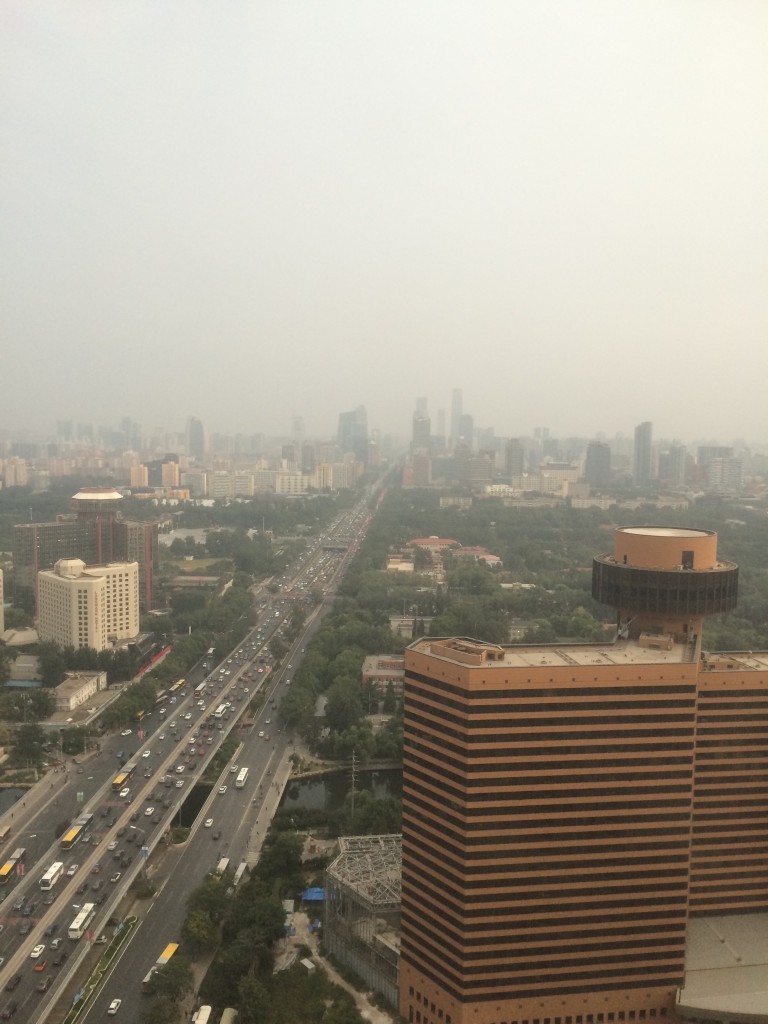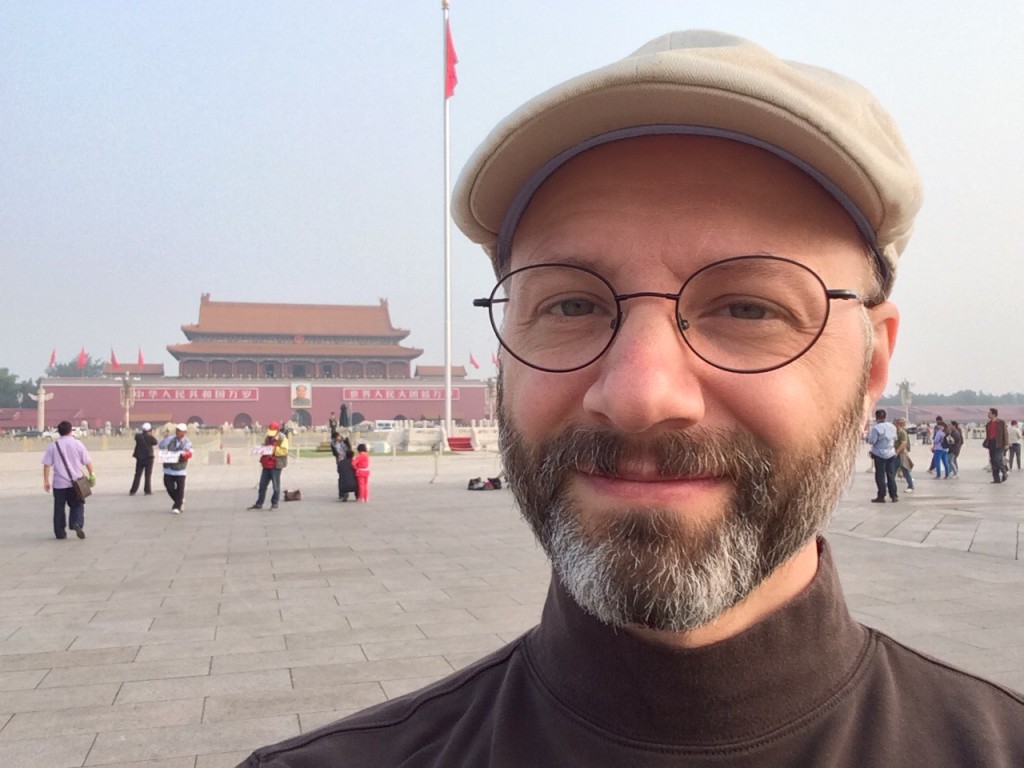Author: Den Hoopingarner
Beijing
Last week I went to Beijing, to spend a few days in the embassy. I am one of the last groups of new arrivals to country that get to do “consultations” in the embassy. It seems that the program is being phased out in favor of more long-term swaps.
This was another first for me: my first time to go to Beijing. The famous air pollution index was actually low when I was there: only dangerous (instead of hazardous, poisonous, or apocalyoptic).
The highlights of my visit were seeing the different ways that things are done in the embassy’s Consular section, and talking with my counterparts. I also got to stand “on the line” and adjudicate visa applications for a few hours. There is a different quality of applicants in Beijing; I had to adjust my assumptions about the intentions of people who wanted visas to go to the U.S.
Another big surprise of the visit was running into someone who I worked with when I was a Fulbright scholar in Taiwan. One of the Engligh Teaching Assistants went on to join the foreign service, and happened to be posted to China at the same time as I was. She joined a few years before I did, and has been in China for about a year already. Neither one of us knew that the other was in the foreign service, and so running into each other in the embassy was a huge surprise for both of us!
I had a free morning before I had to return to Shenyang, so I went to Tiananmen Square and wandered around.
Beijing’s great in a lot of ways. There is a lot going on, there are a lot of cultural resources there, and lot of western food is available. The embassy is about 10 times the size of the Consulate in Shenyang, and because it’s the embassy, of course there’s a lot of high-level activity there.
But I feel like there are more opportunities for me to do a greater range of things in Shenyang. For example, this week the Consulate is celebrating its 30th anniversary. I get to be involved in the planning for the event, and to be there to rub elbows with the VIPs. I don’t think that I’d be able to be involved at that level in a similar event in Beijing.
Yet another reason that I’m glad I’m in Shenyang.
Life is good.
I wonder if this is a sales gimmick
A guy is selling fruit on the sidewalk in front of the Consulate. Out of a cart pulled by a donkey.
Part of me thinks: “wow, fresh from the old countryside, this fruit must be clean and pure and tasty!”
Another part of me laughs in scorn at that part of me, and snorts: “that’s exactly what the guy wants you to think. He probably bought the fruit in the wholesale market, rents the donkey by the hour, and is charging you double for the illusion of countryside food.”
I don’t like that part of me very much, but I suspect that it’s right.
Ego+Temper=Undiplomatic Diplomat
The other day I had to refuse a visa applicant who became belligerent upon receiving my refusal. He kept demanding to know why he was refused, and would not accept the standard reason that we give.
Normally in this situation, we tell the applicant that the visa interview is over, we cannot reverse our decision, and although he is welcome to apply again, he is not qualified for a visa today. We then call the next applicant, thereby making it clear to the applicant that the interview is over. The applicant usually gets the message, and leaves.
This time, though, the applicant refused to leave, and continued to badger me for a reason why he was refused. This sometimes happens. Some applicants are so intent I’m going to America that they simply do not except a refusal. Usually we can defuse the situation by telling the applicant that it’s not a permanent refusal, they can apply again in the future. That usually works for me.
For some reason though, this applicant became hot under the collar, and lashed out at me verbally. This irritated me, and against my better judgment, I engaged him.
I have two serious personality flaws that contributed to what happened next. The first flaw is that when somebody gets in my face, I tend to get right back into theirs. This is not a good personality trait for a diplomat to have. We are supposed to work through conflicts with reason and calm, not slug them out with emotional reactions. However, when someone gets angry with me and I don’t believe that they have good reason to do so, I tend to get angry right back at them. This is a personality flaw that I am trying to overcome. However, it’s pretty well ingrained into my psyche, and it’s hard to get rid of something so deeply a part of my personality.
The second personality flaw is a healthy ego. I am confident in my ability to use Chinese in a variety of situations, even situations that I probably should not engage in. I feel that I have the language skills to engage in debate and argument, and I am egotistical enough to enter into an argument, even when doing so is unwise.
In this situation, those two flaws combined to create a bad situation. My frustrated and unhappy applicant was demanding an explanation, and I was retorting back to him that I had given him an explanation, but he just happened not to like the explanation that was given to him. He raised his voice, I raised my voice, and eventually I told him that he had to leave, or I would call the security guard to escort him out of the Consulate, which I soon had to do.
I should also add that our interview windows are on one side of the main office which everybody sits in, so all of my coworkers were witnesses to this embarrassing outburst. I later apologized to everybody, especially my boss, for causing a scene.
We frequently get this kind of reaction from applicants, but I think that when they encounter it, most of my coworkers have handled the situation better than I did that day.
So I have yet another set of things to work on: curbing my temper and checking my ego.
Eventually, I think that I will be a good diplomat. This incident shows that I still have some work to do, however.
Day of Service
The Consulate closed for the day on September 11, and all employees, both foreign service officers and locally engaged staff, and engaged in various service projects in the city.
I was on the “urban beautification” team, which meant that I picked up trash along the canal. If you know anything about big cities, you can guess that there was a very big beautification potential along the canal.
Several local people were very curious about a bunch of foreigners picking up trash. More than one photo was taken with a cell phone. One guy offered to notify the media. We all had a good laugh at that offer. We can’t imagine that the local non-free press would report that foreigners were doing selfless service projects.
It’s fair to ask that if we weren’t getting local press coverage, is it worth it to engage in these service projects? I think the answer is yes, for two reasons. First, even though the media wouldn’t report on it, as we were out there working, we interacted with several people. When asked who we were and what we were doing, we simply said that we were US diplomats, and we were trying to make the city looked better. I saw a lot of thumbs-up gestures, and heard some approving comments. We did a lot of direct diplomacy that day. For those of us whose job it is to try to further international understanding and prevent wars, this was a big win.
The second reason why this was a worthwhile activity is that service is an appropriate way to remember the people who were murdered on 9/11. Doing something positive for the public good affirms who Americans are as a people, and exemplifies why diplomats are sent to live in other countries.
Disappointing papaya: a solution
Learning from my disappointing experience, I bought a half papaya this time. More expensive, but I can see exactly how ripe it is!









